Celtic Connections at 20
- Published
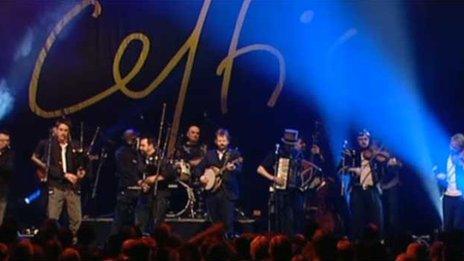
The Treacherous Orchestra are one of the new breed of Celtic Connections favourites
It began as a way to fill Glasgow's Royal Concert Hall in January, but as Celtic Connections kicks off its 20th festival, it has become a massive success that has changed people's idea of Scottish traditional music.
In the early 1990s, Scottish and Celtic traditional music artists were "treated in awe elsewhere in the world", says Colin Hynd, the first artistic director of Celtic Connections.
But they were not necessarily given the best platforms on their own turf, he says.
"Most people in this country, their perception 20 to 25 years ago of traditional music would have been Andy Stewart wearing a kilt on the Hogmanay show singing The Scottish Soldier," says Donald Shaw, the festival's current boss.
"That has changed so much. I think folk music has come to the fore as the real music of this country - the heart and soul."
Mr Shaw, a founder member of Scottish-Gaelic folk band Capercaillie, says it has led to more musicians taking up the traditional instruments and sounds of Scotland and finding new ways to "express how traditional music can be performed".
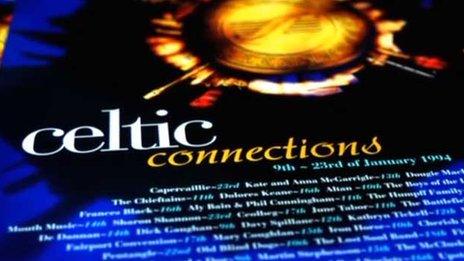
The first Celtic Connections featured big names such as Capercaillie
The first Celtic Connections, in 1994, ran across 15 nights and featured many of the big names from the Celtic music scene.
Mr Hynd, who was part of the events team at the Royal Concert Hall, which developed the idea, admits: "The main remit I had was to fill our venue."
And there was much scepticism about starting a festival in Glasgow over the winter months.
Journalist Sue Wilson says: "People thought it was the wrong time of year, everyone was skint after Christmas and New Year.
"And people thought it was the wrong venue. The concert hall was only about four years old and was still seen as quite a starchy classical music venue."
However, Wolfstone fiddler Duncan Chisholm, who appeared at the first festival, says he was delighted by the idea.
"Immediately, there was a possibility of not just one gig but two or three gigs around the same time," he says.
Chisholm adds: "I remember seeing the first line-up and there were loads of musicians who were my heroes."
Scottish-singer songwriter Karine Polwart says: "It was like having two weeks of everybody I wanted to see on my doorstep."
The first programme included Dick Gaughan, Dougie McLean, The Chieftains, Kate and Anna McGarrigle and the Battlefield Band.
Irish-American band Cherish the Ladies have been firm favourites since the first festival.
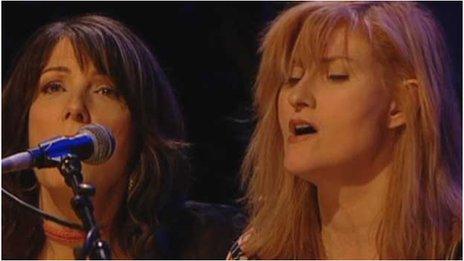
Eddi Reader (right) says the Transatlantic Session are an "ego-free arena"
Joanie Madden from the band says: "I remember calling the girls to tell them we were going to Scotland in the middle of January.
"They said 'what?'. I said 'yeah, there is this new festival taking place in January'. My god, we went there and had one of the greatest times of our lives."
Current artistic director Donald Shaw says: "I don't think anyone realised the potential of it. It may have even been seen as a one-off.
"But, when it grew over the next few years, we knew we had something."
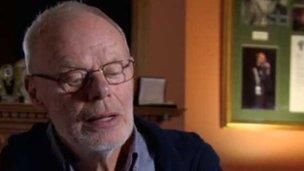
Radio presenter Bob Harris says the festival has "integrity"
Country music radio presenter Bob Harris says: "The growth has not surprised me because I believe that when you are putting together a festival with the integrity that Celtic Connections has then that is going to draw people."
Harris is impressed by how Celtic Connections has grown and adapted without selling out to commercial interests.
"Commerciality gets its teeth into everything, almost, and does quite a lot of damage by its demands and expectations," he says.
"What's impressive about Celtic Connections is, it seems to have resisted all of that, so what you are left with is something with a massive core credibility."
One strand of Celtic Connections that "encapsulates" its spirit of collaboration and co-operation is the Transatlantic Sessions, according to Donald Shaw.
He says the sessions have become the "jewel in the crown" of the festival.
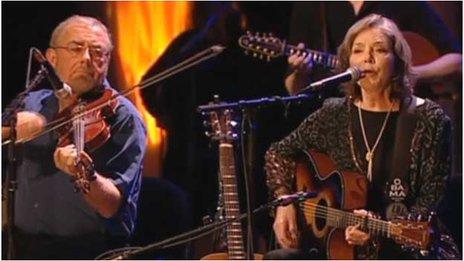
Aly Bain with Nanci Griffith during the Transatlantic Sessions
It features a stellar line-up from both sides of the Atlantic and explores the links between the Celtic countries and North America.
One of the reasons it is so successful, according to Scottish singer Eddi Reader, is that it is an "ego-free arena".
She says: "We have all got egos, but it works best if you acknowledge you have got to leave it at the door."
Celtic Connections legend Phil Cunningham says: "You only get two days run-up before it, so you are bringing 20 to 22 people together from America, Scotland, Ireland and we are making a two and a half hour concert in two days.
"It only happens because of the generosity of each individual musician."
Aly Bain, who along with Jerry Douglas has been the music director of the sessions, says: "When you are surrounded by people who know what they are doing, who are great singers and musicians, it works.
"I can be kind of rocky at times, but it works."
The connections between Scottish-Irish music and American roots music, such as Bluegrass and Americana, are easy to trace via immigration to the United States.
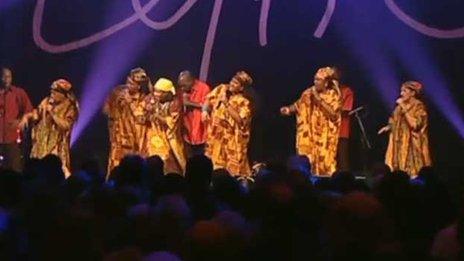
The Creole Choir of Cuba - sometimes the Celtic Connections is not obvious
But sometimes artists appear in the programme who leave people asking 'just what is the Celtic Connection here?'
Donald Shaw says: "The festival has now developed into one which is more about connections than Celtic.
"But we definitely have guidelines. I can usually explain why every single artist is playing in terms of that acts' relevance to folk music or roots music."
In 2011, pop music star Tom Jones found his way to Celtic Connections.
Shaw says: "There was much talk about 'what has Tom got to do with Celtic music apart from being Welsh?'.
"The relevance was that he'd just recorded an album of great old-time Blues songs.
"Once you start getting into old-time American Blues, R&B, Soul, you are going to find folk music right at the heart of it, if you look deep enough."
Aly Bain says: "We can always find links wherever we look, even if they are quite remote.
"I think it is good to expose our young musicians to music from different countries. It gives them ideas."
One of those young musicians, Adam Sutherland of the Treacherous Orchestra, says: "There are folk who will argue whether something is Celtic enough to be in it, but I say 'why can't you make new connections?'"
Celtic Connections runs from 17 January to 3 February., external
- Published17 January 2013